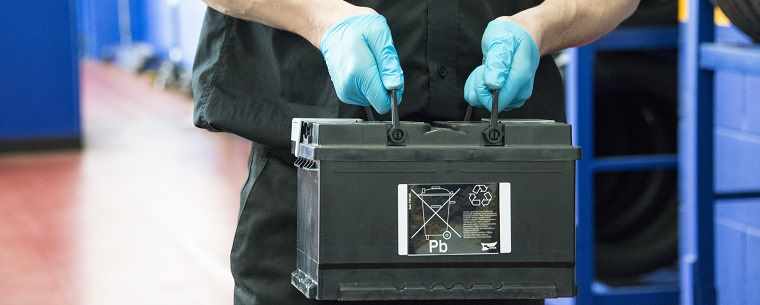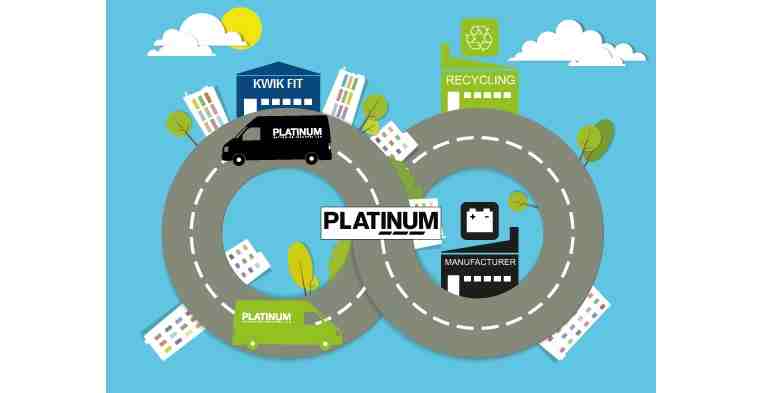How to Dispose of Your Car Battery
Kwik Fit | Monday 10th September 2018 1:30pm

You might think your car runs solely on fuel like petrol or diesel (unless, of course, you have an electric vehicle) but without your car battery you wouldn’t be able to start the engine in the first place.
Batteries are an essential part of keeping you on the road, and much has been written on how to install and maintain them. However, when it comes to car battery disposal, few drivers know what the protocol is. Read on to find out how to safely and responsibly dispose of your car battery.
What do car batteries do?
Car batteries store power so that it is readily available when we need it. In our cars, the battery is essential to start the vehicle, and essentially provides a jolt of electricity to the starter motor. Once the engine is running, the alternator powers the vehicle and the battery is recharged. To find out more about how car batteries work, browse our Battery FAQ Page.
Why is safe car battery disposal necessary?
There’s no arguing just how useful batteries are, but that power comes at a price, and all batteries, from the one in your car to the ones in your smartphone, are classed as hazardous waste. This is because they contain corrosive chemicals like sulphuric acid, which is needed to produce electrical energy when it reacts with lead and lead dioxide.
If not disposed of in the correct manner, these toxic chemicals can leak from the battery and contaminate the surrounding area, such as soil and water sources, which can have a negative effect on both plant life and wildlife. Our planet is amazing and we all have a duty of care to protect the environment that we work and live in.
Our car battery disposal schemes
At Kwik Fit, we recognise the importance of addressing environmental sustainability and as such, are dedicated to reducing the environmental impact of the potential use and disposal of our battery products. More than 90% of all scrap batteries are recycled, making them one of the most recycled consumer products on the market. By comparison, only 65% of newspapers, 30% of all plastics and just 26% of glass bottles are recycled.
Each year, 4.5 million tonnes of lead goes into the production of lead-acid batteries like the one found in your car and 97% of that can be recycled. Read about our environmental responsibility here.
We provide a ‘cradle to grave’ solution for our customers. Not only do we supply the latest AGM start-stop batteries, specifically designed to reduce the vehicle’s carbon footprint and CO2 emissions, but we also focus on recovering the old ‘scrap’ battery and recycling it. Kwik Fit works in partnership with Platinum International who's legally compliant, environmentally friendly ECO-life scheme is helping us to recycle all the old batteries that come into our centre.

Buy car batteries from Kwik Fit
Car batteries can’t be thrown out with your household waste, so if you are looking for a new battery, Kwik Fit stocks batteries for most makes and models - and we’ll environmentally dispose of your old scrap battery too. So, there’s no need to worry about taking it to your local recycling centre.
If you are having battery health problems, book in for a free battery health check at Kwik Fit. In the meantime, you can find out how to make your batteries last longer here.
Any facts, figures and prices shown in our blog articles are correct at time of publication.
Featured Articles
Is it Illegal to Drive With One Headlight?
Saturday 19th July 2025
Wondering if it’s illegal to drive with one headlight? Learn about the safety risks and penalties of illegal blown bulbs and why you should fix them promptly.
Air Con in EVs & Hybrids: Experts Answer Your Questions
Monday 30th June 2025
Does air con drain EV batteries? Can you use the air con while charging an electric car? Find out the answers to these questions & more from Kwik Fit’s experts.
Why Is Your Car Making a Noise? Fixes & Tips
Friday 13th June 2025
When your car starts making unexpected noises, it can certainly be quite disconcerting; it may be nothing to worry about, but here’s what you need to know.









